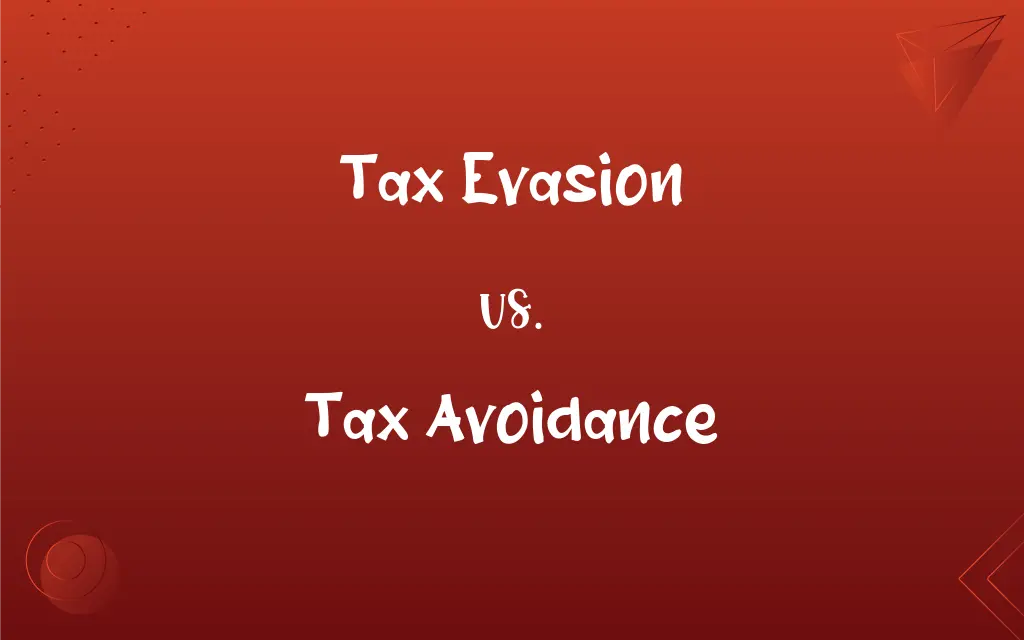Tax Evasion vs. Tax Avoidance: What's the Difference?
Edited by Aimie Carlson || By Harlon Moss || Updated on November 16, 2023
Tax evasion is illegally underreporting income or inflating deductions to reduce tax liability. Tax avoidance is legally minimizing tax liability through deductions and credits.

Key Differences
Tax evasion and tax avoidance both involve ways in which individuals and businesses handle their tax responsibilities. Tax evasion is the illegal practice of not paying taxes owed, often involving falsifying information or hiding income. Tax avoidance, on the other hand, is the legal use of loopholes and strategies to reduce the amount of tax owed.
Both tax evasion and tax avoidance are ways that people try to reduce their tax burden, but they differ significantly in legality and ethical considerations. Tax evasion can result in serious penalties, including fines and imprisonment. Tax avoidance, while legal, can still be seen as unethical by some, as it involves exploiting the tax system to one's advantage.
While tax evasion involves intentionally breaking the law to avoid paying taxes, tax avoidance involves working within the law but bending the rules to reduce tax liability. Both practices can result in a loss of revenue for the government and can contribute to inequality, as those who can afford expensive tax advisors are more able to take advantage of tax avoidance strategies.
Although tax evasion and tax avoidance are often used interchangeably, it is important to understand the distinction between the two. Tax evasion is a criminal act that involves deliberately evading tax payments, while tax avoidance is a legal practice that involves minimizing tax liability within the bounds of the law. Both can have negative impacts on society, but the legal and ethical implications of each are different.
Comparison Chart
Definition
Illegal means to reduce tax
Legal means to reduce tax
ADVERTISEMENT
Consequence
Fines, imprisonment
No legal consequences
Perception
Unethical, criminal
Legal but possibly unethical
Examples
Hiding income, falsifying documents
Using deductions, loopholes
Impact on government revenue
Reduces revenue significantly
Can reduce revenue
Tax Evasion and Tax Avoidance Definitions
Tax Evasion
Tax evasion is the illegal act of not paying taxes owed.
He was arrested for tax evasion after hiding his income.
ADVERTISEMENT
Tax Avoidance
Tax avoidance can result in significant tax savings.
Businesses often use tax avoidance to maximize profits.
Tax Evasion
Tax evasion can include hiding income or assets.
He used offshore accounts for tax evasion.
Tax Avoidance
Tax avoidance can include taking advantage of deductions and credits.
They used tax avoidance strategies to reduce their taxable income.
Tax Evasion
Tax evasion is punishable by fines or imprisonment.
They faced severe penalties for tax evasion.
Tax Avoidance
Tax avoidance is often seen as exploiting the tax system.
Some view tax avoidance as unethical.
Tax Evasion
Tax evasion is an unethical and criminal act.
Engaging in tax evasion is a serious offense.
Tax Avoidance
Tax avoidance is the legal use of strategies to minimize tax liability.
She hired an accountant to help with tax avoidance.
Tax Evasion
Tax evasion involves falsifying information to reduce tax liability.
She committed tax evasion by inflating her business expenses.
Tax Avoidance
Tax avoidance is legal, but can be complex and costly.
Hiring a tax advisor for tax avoidance can be expensive.
FAQs
What are some examples of tax evasion?
Examples of tax evasion include hiding income, inflating deductions, and using fake documents to reduce tax liability.
Is tax avoidance legal?
Yes, tax avoidance is legal and involves minimizing tax liability through legal means.
Can you go to jail for tax evasion?
Yes, tax evasion is a criminal act and can result in imprisonment.
What are some examples of tax avoidance?
Examples of tax avoidance include using legal deductions and credits to minimize tax liability.
Is tax evasion a federal crime?
Yes, tax evasion is considered a federal crime in the United States.
Can tax evasion be seen as unethical?
Yes, tax evasion is widely viewed as unethical and criminal.
What is the main goal of tax avoidance?
The main goal of tax avoidance is to legally minimize tax liability.
What is the difference between tax evasion and tax avoidance?
The main difference is legality; tax evasion is illegal, while tax avoidance is legal.
Can tax evasion result in a loss of government revenue?
Yes, tax evasion can significantly reduce government revenue.
Are there penalties for tax avoidance?
There are generally no penalties for tax avoidance, as it is legal.
Are there consequences for tax avoidance?
There are generally no legal consequences for tax avoidance, as it is legal.
Is tax evasion legal?
No, tax evasion is illegal and involves not paying taxes owed.
Can tax avoidance result in a loss of government revenue?
Yes, tax avoidance can result in reduced revenue for the government.
What is the main goal of tax evasion?
The main goal of tax evasion is to illegally reduce tax liability.
Is tax avoidance ethical?
The ethics of tax avoidance are debated, as it involves legally exploiting the tax system.
Can individuals engage in tax evasion?
Yes, both individuals and businesses can engage in tax evasion.
Can tax avoidance be seen as unethical?
Some people view tax avoidance as unethical, as it involves exploiting the tax system.
What are the consequences of tax evasion?
Consequences of tax evasion can include fines, imprisonment, and a criminal record.
Can individuals engage in tax avoidance?
Yes, both individuals and businesses can engage in tax avoidance.
What are the penalties for tax evasion?
Penalties for tax evasion can include fines, imprisonment, and a criminal record.
About Author
Written by
Harlon MossHarlon is a seasoned quality moderator and accomplished content writer for Difference Wiki. An alumnus of the prestigious University of California, he earned his degree in Computer Science. Leveraging his academic background, Harlon brings a meticulous and informed perspective to his work, ensuring content accuracy and excellence.
Edited by
Aimie CarlsonAimie Carlson, holding a master's degree in English literature, is a fervent English language enthusiast. She lends her writing talents to Difference Wiki, a prominent website that specializes in comparisons, offering readers insightful analyses that both captivate and inform.







































































